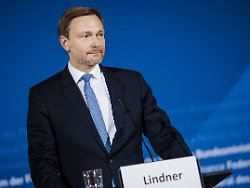Friday 10th December 2021
Credit authorization maxed out
Lindner’s “Booster” increases the mountain of debt
The current budget planning allows for new debts amounting to 240 billion euros. It is actually intended to fight the pandemic. But less is necessary than expected. The new federal government is now reaching for the rest to expand the energy and climate fund.
The new federal government made up of the SPD, the Greens and the FDP is creating a billion cushion for future investments with unused loans amounting to 60 billion euros. Finance Minister Christian Lindner announced that a supplementary budget would transfer unused credit authorizations in this amount to the previous Energy and Climate Fund (EKF). “The second supplementary budget is a booster for the economy,” said Lindner in Berlin. The new debt of up to 240 billion euros approved by the Bundestag for 2021 will not be exceeded. “So there will be no additional debt.” The cabinet is expected to launch the supplementary budget on Monday. The Bundestag passed the first supplementary budget in April.
With the billions, the Ampel-Coalition creates an additional reserve for investments in climate protection and in the transformation for a climate-neutral economy. This budgetary trick is made possible by the fact that the previous government had the Bundestag approve far more debts than are actually needed due to the corona pandemic. It only takes around 180 billion in new debt, according to a senior ministry official. This can be “estimated now”.
The high borrowing is possible because due to the corona pandemic there is an exception to the debt brake, which normally only allows the federal government to borrow 0.35 percent of economic output. “We are of the opinion that this is compatible with the debt rule,” it said in government circles. Technically, the same path had already been taken with a grant to the EKF at the end of 2020. At the time, there was no criticism from the then ruling Union party, it was said, with a view to the criticism of the process that has now become loud. “It’s relatively unspectacular to implement.” In the “Handelsblatt”, Court of Auditors Kay Scheller had raised constitutional concerns.
Lindner confirmed that the federal government will comply with the debt brake in the federal budget again from 2023. He did not comment on the year 2022. The new coalition has yet to draw up a budget for the coming year. The previous government with the then Finance Minister Olaf Scholz had planned with a new debt of around 100 billion euros. Lindner pointed out that further support measures would be necessary to cope with the corona pandemic, such as help for the economy and additional expenditure in the health system: “Well, we cannot yet run the normal program in terms of financial policy.”
